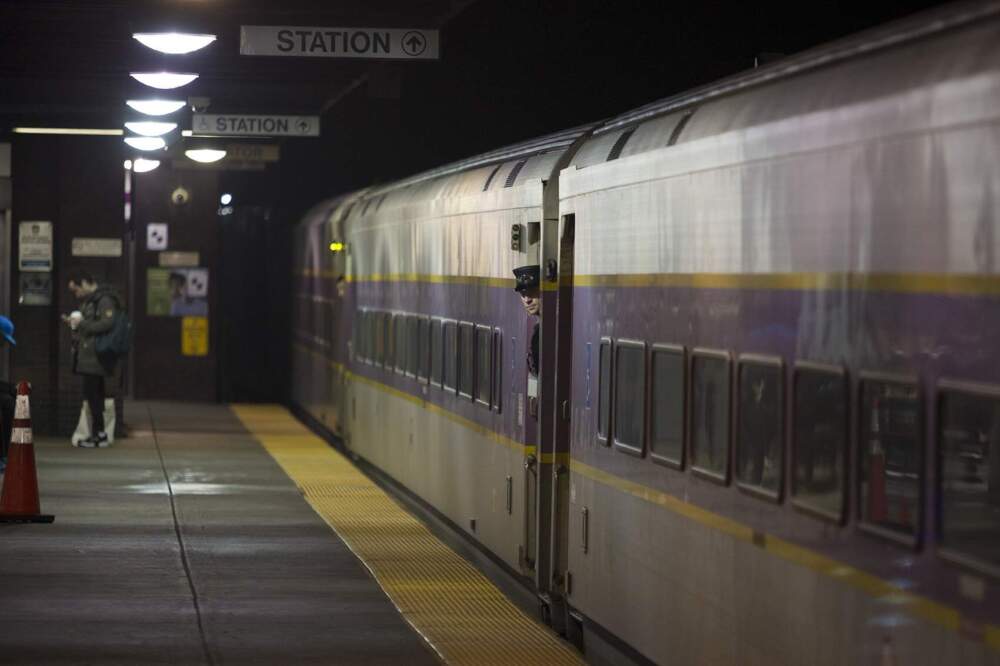Advertisement
Keolis commuter rail workers protest wages, benefits at MBTA Board meeting

The breakthrough labor agreement MBTA officials and union leaders reached last year included significant increases in pay, retention bonuses and other perks that supporters say are already yielding benefits for the workforce's culture.
But over on the commuter rail, whose operations the MBTA contracts out to Keolis Commuter Services, employees are telling a far different story.
More than a dozen Keolis workers packed into an MBTA Board meeting Thursday to describe low pay and lackluster benefits, and they urged the agency's leader to think about "safeguards" the T can install when the time comes to decide the future of commuter rail operations.
"For years, the MBTA has treated the commuter rail as the illegitimate stepchild of the MBTA, only paying child support to whoever runs it, and the provider takes their cut before it comes down to us," said Ed Flaherty, president of Local 2054 Transportation Workers Union, which represents car inspectors and coach cleaners at Keolis, Amtrak and CLX.
Negotiations are ongoing between Keolis and unions representing more than 2,000 employees, and Flaherty said the company's talks so far with his union have proceeded "in good faith." However, he described significant disparities that have opened up in the past two decades or so.
When Amtrak was in charge of running the T's commuter rail about 20 years ago, Flaherty said, worker wages were "identical" across the two agencies, and employees at the commuter rail were paid similarly to their counterparts at other agencies.
"Today, we are the lowest-paid by far," Flaherty told the board, describing his colleagues as paid 12% less than Amtrak workers, 16% less than workers at Metro North, and 11% less than workers at New Jersey Transit.
Some Keolis employees work 80 hours per week "just to live in this very expensive state," Flaherty said, adding that there are first-year cleaners who earn little enough to qualify for SNAP benefits and housing vouchers despite working 40 hours per week. He also contended that some Keolis workers are among the only employees in Massachusetts with no paid sick time.
"These jobs used to be a path to the middle class, not a path to the welfare line," he said.
Advertisement
The MBTA first tapped Keolis, a French transportation company that operates several rail networks around the world, to operate its commuter rail system in 2014 with an eight-year, roughly $2.7 billion base contract.
MBTA officials in 2020 agreed to extend Keolis's contract through June 30, 2026, though at the time, they said the T could opt to end the contract one year earlier if they want to begin formally searching for a successor.
A T spokesperson said Thursday that the MBTA is "considering potential alternative approaches for its successor contractual structure," with a focus on achieving a decarbonized, high-frequency "region rail" service in both directions.
According to Keolis, previous negotiations with unions provided raises roughly once per year between 2017 and 2022. The last raise took effect June 15, 2022.
"Keolis Commuter Services is one of the largest employers in Massachusetts and we are proud to have more than 14 unions representing our workforce of nearly 2,500," a Keolis spokesperson said Thursday. "We are currently negotiating in good faith with each collective bargaining unit, including TWU, to amend their existing collective bargaining agreements, and we look forward to coming to agreements that are fair to workers and ensure that we can continue to operate the Commuter Rail safely and reliably on behalf of the MBTA."
Flanked by fellow workers, Flaherty told the board, "We will not take a contract that's outside the industry standard. To me, this is proof that privatization does not work."
"Under the National Railway Labor Act, we have to go through so many steps before we have to strike. Keep in mind, we don't want to strike, but when we're legally able to, we will," Flaherty later added.
MBTA Board Chair Tom Glynn said the T's general manager, Phil Eng, has been "working to try to move this situation forward."
"We have talked with Keolis with regards to the status of this, and we do value the workforce. All of the things that you've asked for, my understanding, are being discussed right now, robustly back and forth," Eng said. "We do look for good resolution between the parties because we do understand just how important it is for everyone to not only be able to perform their job, but to live the quality of life that they're looking to do."
Later in Thursday's meeting, Eng offered praise for the commuter rail's performance, which in the past few years has emerged as a bright spot for the MBTA with some of the highest ridership compared to pre-pandemic levels.
In fact, according to Eng, the MBTA's commuter rail now has "the strongest return to ridership post-pandemic across the nation of all the commuter rails."
For MBTA board member Mary Skelton Roberts, that fact was "incredibly ironic."
"It has incredible service, and we had members from the union here saying that they're not being treated well," Skelton Roberts said. "I hope it's something that we really take a serious look at. When you have that level of performance, you want to make sure your staff is being — I mean, I know this isn't your staff, but you want to make sure the staff is well cared for."
"They are our workforce. We consider them all in one. We're all the T," Eng replied. "We understand there's a negotiation that is ongoing, but we are fully supportive of workforce, the importance of workforce, and we'll stay on top of that."